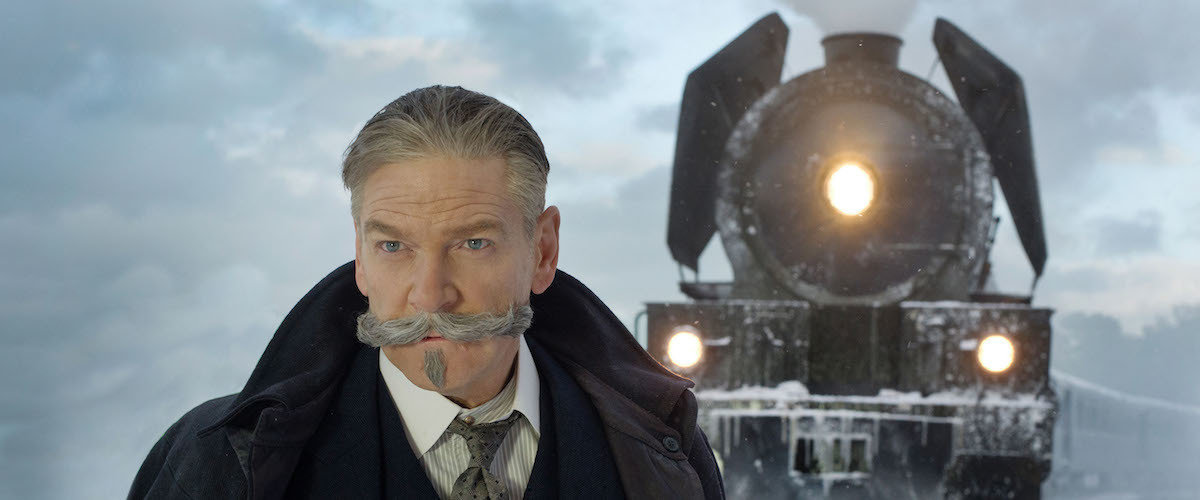
Directed by: Kenneth Branagh
Starring: Kenneth Branagh, Johnny Depp, Michelle Pfeiffer, Penelope Cruz, Josh Gad, Leslie Odom, Jr., Daisy Ridley, Willem Dafoe, Judi Dench, Derek Jacobi, Tom Bateman
Because I want to tread lightly and not give away spoilers, I feel free to compare Kenneth
Branagh's remake of Agatha Christie's classic whodunit to Sidney Lumet's 1974 film, which if I were reviewing I would give three and a half stars. Albert Finney, who played Hercule Poirot in Lumet's version, thoroughly reveled in his role of the Belgian sleuth with a meticulous eye for detail and lies. Don't say anymore around Poirot than absolutely necessary, because he doesn't miss a thing. And he would never be shy about telling you of his brilliance.
Branagh's Poirot is more dramatic, less subtle, and even has a lost love whose picture he says goodnight to before dozing off for the night. Who knew Hercule Poirot ever had a girl? Branagh's facial hair is as wild as his acting flourishes, which isn't a bad thing. The movies themselves are contrasts in style. The murderer (or murderers) aboard the famed train in Lumet's version were killers alright, but they did it, with dare I say panache and a touch of class. You have genuine movie legends like Ingrid Bergman, Sean Connery, Wendy Hiller, Anthony Perkins, and Jack Warden in the cast. No need to ruffle their feathers while trying to solve the perfect murder. But, it is just that reserve which made Lumet's version so fun to watch. Their feathers do get ruffled as much as they try not to show it and Poirot twisting the knife is devilish fun.
The cast in Branagh's version is more prone to raw passion and emotion. Even the killing, when it is shown, is more violent and shot more frenetically, while the killer (or killers) in Lumet's version not only go about their business of killing more quietly, they helpfully explain their motives while doing the dastardly deed. The victim here is Ratchett, played by Johnny Depp as a guy oozing secrets and sleaze. You just know he is rotten through and through. In Lumet's version, Ratchett is played by Richard Widmark, who at least attempts to provide his Ratchett with some attempt at a classy facade, so as to throw off everyone as to his wicked past.
No matter. Ratchett is soon found dead in his train compartment with multiple stab wounds to his chest. Poirot, who was looking forward to a relaxing train ride before his next assignment in Asia, is thrust into solving the case by Mr. Bouc (Bateman), the railroad company owner who doesn't want the bad publicity of an unsolved murder aboard his train. The train is also snowbound by an avalanche, so all of the suspects (which is pretty much everyone) are trapped aboard and thus easy to interrogate for Poirot. It's not like they have anyplace to go.
Branagh's method of interrogation is to relax his subjects into saying more than they should. Extraneous personal information is used against them because Poirot, as he never tires of telling anyone, is the world's greatest detective and connects the dots quickly. The plot did not count on Poirot being aboard the train, so improvisation becomes a tall order. The cast in this film does not hold much in reserve. There are allusions to current sociological issues, such as an interracial romance between Ridley's governess and Odom's doctor which they try desperately to hide. We see various takes on religion and guilt, which plays a part in one character looking like she is just dying to spill the beans because her conscience can't handle the weight of the deed. Poirot's conscience is also tested in critical scenes because Ratchett, as we learn, is a villain who got what was coming to him. Does the justification excuse the crime? Poirot painstakingly works his way through the ethics and logistics of the case, while Finney's Poirot was a smoother operator who played everything, including his conscience, close to the vest.
Trust me. I have not revealed any spoilers. I saw the 1974 version several times, so I knew how the movie would end barring a swerve which would have been delightful. I watched this version to see how a different, yet no less talented cast, would handle the same material. They play it differently, much like a singer puts his/her spin on an old classic, but they still are effective. Branagh makes much use out of beautiful cinematography and what looks to be part CGI to make the mountains the Orient Express travels through much more foreboding. We even see a little of Poirot's quirks, which border on OCD. But mostly, we see a retelling of Christie's book and Lumet's film adaptation done well, with perhaps more raw emotion which makes Branagh's take seem more contemporary.
No comments:
Post a Comment